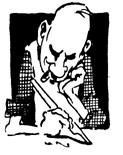
The Lost Art of Letter Writing
E-MAIL JUST DOESN'T MEASURE UP
What is one of the simplest, most inexpensive, and dearly cherished gifts a person can receive on any day of the year? It is a personal letter. It is a simple gift because it does not require shopping or travel; it is inexpensive because it costs less than 50 cents; and it is cherished because it possesses a permanent, enduring quality, something often saved or carefully preserved by its owner. As one collects his daily mail and recognizes the usual bills, the credit card advertisements, special store offers, and solicitations from various charitable organizations, a personal letter with distinctive handwriting and individual stationery sparkles like a gem. As the world becomes more impersonal and dehumanizing, a personal letter cheers and warms the heart and humanizes daily life. Life is not just business or work but play and delight, and a friendly letter serves no utilitarian purpose but is an activity enjoyable for its own sake.
As welcome as telephone calls are from family members and friends, nothing compares to a letter. Many favor letters to telephone calls for the simple reason that letters allow for re-reading and sharing with others. Personal letters possess a taste, flavor, and style which lend themselves to savoring their content and sentiments. Somehow a telephone call, despite the length of the conversation, remains ephemeral, often hard to recall, and sometimes seems aimless or repetitious and never quite leaves as powerful an impression as a letter. While a telephone call reflects thoughtfulness and good will, it does not move or reach the heart with the same effect as a personal letter.
Why do letters gladden the heart and lift the spirit? Often they arrive as surprises, most of which could begin: “I bet that when you woke up this morning you never dreamt of receiving a letter from me.” These letters remind us that life is filled with unexpected gifts and unforeseen occasions of hope. One recognizes that ordinary life transcends the prosaic and humdrum, and that grace is present in our daily experience.
Personal letters reassure people that they are unique, not merely social security numbers or anonymous customers. Someone found the time and took the interest and gave priority to the importance of communicating to a friend, relative, or loved one; someone realized the importance of the little things that beautify and civilize daily existence; someone still knows and practices the virtue of graciousness. A friendly letter testifies to the goodness of the human heart.
The arrival of a letter, however, not only rejoices the spirit of the recipient but also expands the heart of the writer. The art of letter writing involves imagining the presence of the other person. The writer must recall everything about the person being addressed — his character, temperament, sensibility, interests, and background — and imagine being in his company and holding a conversation with him. Letter writing cultivates in the correspondent the art of pleasing another person by engaging in common topics of interest, displaying a sense of humor, offering wise advice, acknowledging gratitude, or expressing love. Letter writing requires effort, concentration, and thought, even though it can be lighthearted, whimsical, and informal. One must find something to say that is substantive, engaging, or entertaining. In short, letter writing cultivates contemplation, an essential higher mental activity that transcends the mere exchange of information.
You May Also Enjoy
Reviews of Controversies: High Level Catholic Apologetics... In Good Soil: The Founding of St. Louis Priory and School, 1954-1973... Nourishing Faith Through Fiction: Reflections of the Apostles' Creed in Literature and Film
Pronoun Prisoner... Corpse Composting in California... Final Frontier... Finger-Lickin’ Gross... Honey Coma... A Page from History... and more
Sins of the Fathers... Jim & Tammy Faye Jr... Out of Comptrol... Chip in the Ol’ Block... GPT Glitch... Throwaway Culture... and more

